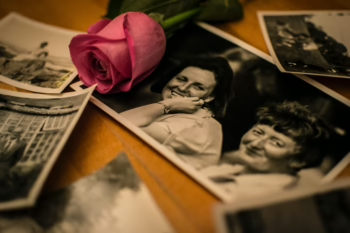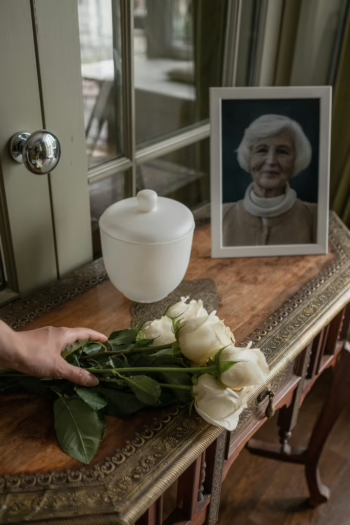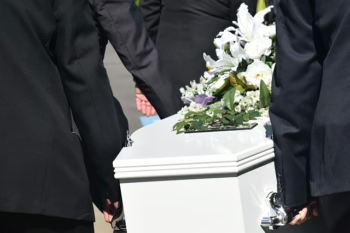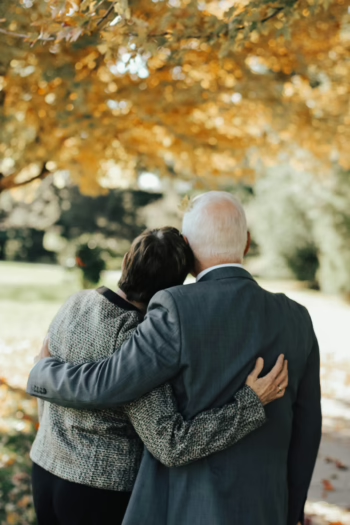Maybe you’ve heard about direct cremations – which are unattended and don’t involve any kind of funeral ceremony – and are wondering if this is the right choice for you or someone close to you.
This blog explores some of the reasons why people choose a direct cremation and explains how you can follow a direct cremation with a separate memorial service or ash ceremony, if you wish.
In just five years, direct cremations have risen from only 3% of all funerals in 2019 to more than 11% in 2023*. Something which used to be an unusual choice has become increasingly mainstream and accessible. So why are so many more people opting for direct, unattended cremations now?
Why choose a direct cremation?
Affordability is a major factor. Funerals can be expensive and a direct cremation costs significantly less than a funeral with a service.
Direct cremations tend to happen early in the morning, when it is less expensive to book a slot at the crematorium. They tend to involve a simple coffin, without flowers, additional cars or other extras which carry their own costs. They are also simpler for funeral directors to arrange, saving time and money.
But it’s more than the money. You might choose a direct cremation because you feel it best reflects the character and preferences of the person who has died. For example, if that person didn’t like a lot of fuss or were quite a private person.

In particular, if the person who died was not religious, there will be no specific rituals that require a service or ceremony to carry out.
There are also very practical reasons for choosing a direct cremation:
- Family members who live overseas or far away may struggle to attend a funeral ceremony in the weeks after someone has died, especially if the death is unexpected.
- There may be family tensions or disagreements that mean getting everyone together would be too stressful or difficult.
- If someone has died after a long illness, you may feel too exhausted and overwhelmed to plan a funeral service straightaway.
- And finally, you might be organising a funeral for someone who has already made their desire for a direct cremation very clear. They may have told their family or friends, left written instructions, or even paid for it in advance. Your role, then, is to carry out their wishes.

Why a direct cremation might not be right for everyone
Some people feel that a direct cremation does not give the sense of closure that can come from a traditional funeral ceremony. After all, who is the funeral for – some would say it’s for those who are left behind.

A funeral, and the collective experience of recognising a unique life and legacy, by family, friends, and the wider community can be a great comfort at a very difficult time, and a marker in the grieving process. Without that communal event taking place quite soon after the death, many people feel that they are missing a step in their grief journey.
What do I need to know about direct cremation?
Direct cremations are offered by many local or independent funeral directors and larger funeral companies, as well as internet-only, national providers.
While you are unlikely to be able to choose the time or location of the cremation, and you will not be able to have a ceremony during the cremation, different providers offer different services.
For example, some will let you know when the cremation will happen, others allow you to accompany the coffin to the crematorium. It’s worth doing a little research, reading reviews and asking questions before you make your decision.
Having a humanist ash ceremony or memorial service after a direct cremation
Even though, traditionally, the cremation or burial of someone’s body and the commemoration of their life take place at the same time, this doesn’t have to be the case.
If you decide that direct cremation is the right choice for you, you can still hold a ceremony to celebrate and remember the life of the person you love, to grieve together with friends and family, and to support each other.

Many people choose to hold an ash scattering ceremony or memorial service weeks, months, or even years after a direct cremation – the first anniversary of a loved one’s death is a natural time to remember them. A humanist celebrant can help you plan a personal, meaningful, non-religious ceremony that reflects the unique life of the person who has died.
You can search for a celebrant near you here, and you can contact them at any time, before or after the direct cremation takes place.
A memorial service is different from a funeral in a few significant ways.
- There will be no coffin, therefore many people choose a different focus, perhaps a photo of the person who has died or an urn with the person’s ashes.
- You can hold it on a date to suit you. A memorial service can take place some time after someone dies, perhaps on a significant date, such as the first anniversary of your loved one’s death, or their birthday, or at a time when friends and family are more easily able to travel. You may find it is easier to manage some time after all the administrative tasks that are required when someone dies are complete.
- It is much more flexible than a funeral. You can hold a memorial service anywhere – from a hotel to your home, from a favourite pub to a local outdoor space. You can choose somewhere that expresses the character of the person who has died and that suits the people who will be attending. It doesn’t have to be near where the person lived or where they died.
- You can also choose the length of the ceremony, rather than having to fit a crematorium time slot. An event away from a crematorium means that you are not bound by the limited time slots, and there will be more time for family and friends to participate, with readings, music, singing – anything you choose.
- You could also choose to link the memorial service to a ceremony to scatter the ashes. Find out more here.
Thoughts on celebration of life ceremonies after a direct cremation from humanist funeral celebrant, Deborah Steed:
“After having a direct cremation, families and friends still want to honour their loved one, celebrate who they were, and the impact they made. They still want to mark their death and say goodbye. For this reason, celebration of life ceremonies aren’t necessarily very different in structure from the more familiar funeral ceremony. They can still include a tribute, personal eulogies, readings and music. However, the lack of time constraint means that we can have more of these things. One lovely ceremony I conducted involved five pre-written eulogies. We then threw the floor open to anyone who would like to add their stories and, after some initial shyness, many did, often with others joining in and adding details. Sometimes, people feel a little awkward about laughing at a funeral but the informality of a celebration of life ceremony allows people to relax and remember the good times.
“Another family held the ceremony in their grandad’s home and turned the dining room into an exhibition of his life; they covered the walls, dining table, and sideboard with photographs, love letters their grandad had written their gran when he was serving abroad, pages from his memoirs, and cards of condolence sent by people who were unable to attend.
“Somehow, even though the physical presence of the loved one may be missing because of the lack of a coffin, these ceremonies are often more personal than a funeral and wake. My role is to help the families move away from the, often unsettling, idea that it’s a funeral, but less so, to the idea that it’s not a funeral, but it can be something much more.”

In terms of the specific content of the ceremony, that’s up to you! Your humanist celebrant will listen to what you want, ask questions, share their experience and craft a ceremony, which can include music, readings, a eulogy or other creative elements. Find more details and ideas here.
A ceremony can be a deeply meaningful opportunity for you to share stories and memories, support each other in your grief and to say goodbye to the person who has died. But it’s also important that you feel able to do it your way, whatever that looks like and whenever it takes place. We’re here to help.





